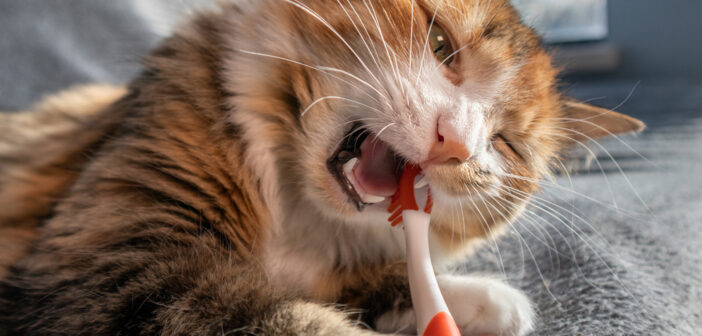According to the American Veterinary Medical Association (AVMA), dental health is a very important part of your pet’s overall wellbeing. Their teeth and gums should be checked at least once a year by a veterinarian to look for early signs of a problem and maintain good mouth health.
The American Animal Hospital Association (AAHA) Guidelines for Pet Owners explains that dental disease is a painful condition that occurs when bacteria, plaque and tartar build up on the teeth and get trapped beneath the gum line. Bacteria can be absorbed into the bloodstream and wreak havoc on other major organs throughout the body.
By age three, most dogs and cats have some degree of dental disease. The early signs include bad breath, yellow tartar buildup on the teeth, and red and swollen gums. Early detection is vital. AAHA recommends that a dental evaluation be part of your pet’s annual preventive care exam.
X-rays are essential for diagnosing dental disease. After examining x-ray images of cats and dogs with teeth that appeared normal to the naked eye, veterinarians found 27.8% of dogs and 41.7% of cats had diseased teeth.
Animals don’t like to hold still for x-rays and sharp instruments are used to clean the tartar from their teeth. Anesthesia makes dental evaluation and treatment safer and less stressful for your pet. When your pet is anesthetized during the procedure, the veterinarian can make a more accurate diagnosis and decrease the chance of complications.
Anesthesia is much safer than you may think. Before anesthesia, your pet will be carefully screened with bloodwork and other tests to ensure she is free from underlying disease. During the dental procedure, a trained professional will be dedicated to continuously monitoring, recording vital signs and communicating findings to the veterinarian.
Removing plaque from teeth beneath the gum line is vital. Bacteria thrive under the gum line, causing infections deep in the tooth root and jaw that can spread throughout the body and affect other organs, such as the heart and kidneys.
Daily toothbrushing will promote good oral health and prevent potentially expensive surgeries for your pet down the road. Accumulation of plaque and tartar can be prevented with a special dental diet – food specifically designed to help promote oral health.
Sources: aaha.org, avma.org








